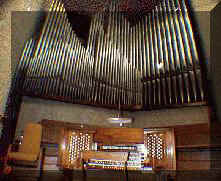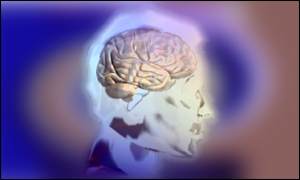Complete Mendelssohn organ works in Pasadena
Friday, May 26th, 2006  This picture shows the Aeolian-Skinner organ at the Pasadena Presbyterian Church, the site of a program featuring nine organists performing the complete organ works of Mendelssohn on Sunday, June 25, 2006.
This picture shows the Aeolian-Skinner organ at the Pasadena Presbyterian Church, the site of a program featuring nine organists performing the complete organ works of Mendelssohn on Sunday, June 25, 2006.
Mendelssohn lived to only 39, dying in 1847 after a series of strokes. The world would be much poorer without the brilliant set of sonatas he had completed just two years earlier—arguably the most powerful, lush, compelling works in the entire organ oeuvre.
An interesting feature of the PPC organ is the so-called “Echo organ” of 14 ranks in the rear of the church. Such multiple-organ setups often work less than ideally, but is an absolutely perfect fit here, especially for Mendelssohn’s favored loud/soft counterpoints, in the first and other sonatas.

 22 straight hours of Bach’s organ music. All of it. That was the program for BachWerke (
22 straight hours of Bach’s organ music. All of it. That was the program for BachWerke ( Carl Zimmer’s article on musical hallucinations in the July 12 New York Times, with the catchy title
Carl Zimmer’s article on musical hallucinations in the July 12 New York Times, with the catchy title  The “Mozart effect” is now firmly ensconced as a mass culture meme. But what is the precise mechanism at work?
The “Mozart effect” is now firmly ensconced as a mass culture meme. But what is the precise mechanism at work? Coming soon to a mobile phone near you: ringtones that enhance brain functioning.
Coming soon to a mobile phone near you: ringtones that enhance brain functioning.